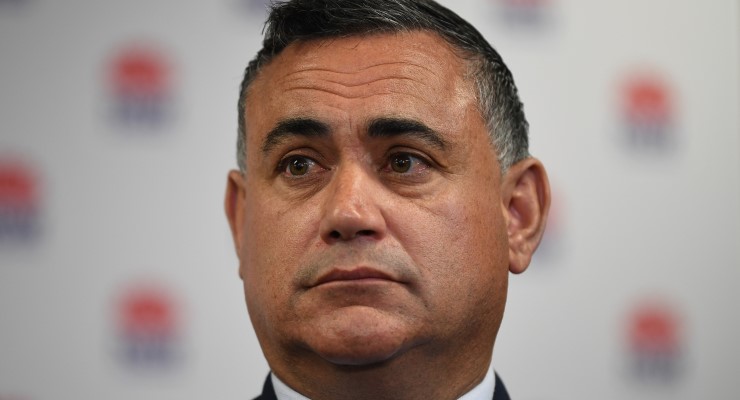
For the past few weeks all eyes have been on the NSW trade commissioner job in New York. But the position that John Barilaro will never have is just one of many roles in which Australians are sent abroad by state governments to encourage trade and investment. Crikey takes a look at who and where taxpayer money has been invested by each state for trade and investment commissioners.
Queensland has the most, with a remarkable 12 foreign positions, Victoria has five (eight if you include the three people in charge of overseas offices that forgo “commissioner” in their title), South Australia has seven, WA has five. Tasmania prefers to call their four positions “trade advocates”. NSW currently has six overseas “hubs”, all posts which were finalised in June.
Very few of these are actually “jobs for mates” — they’re usually experienced trade and investment public servants or former business figures who have extensive experience in the country or region they’re responsible for.
How much do they cost? Barilaro’s putative $470,000 salary for the New York role might have been at the high end but that came with a whole bunch of on-costs — staff (in New York, four of them, costing nearly one million dollars in salaries), plus office fitout costs and other expenses. Even if, as frequently happens, state commissioners share digs and staff with Austrade overseas, rent in some of the world’s biggest cities doesn’t come cheap.
A very conservative annual estimate would suggest a $400,000 average salary package for each commissioner, $150,000 in salary and expenses for each support staff member (let’s assume 2.5 for each position), plus another $50,000 per person office costs, and $100,000 a year entertainment budget (schmoozing, after all, is the point of the role).
That gives the following totals:
Queensland
Tom Calder — ASEAN
Julie-Anne Nichols — China
Dave Stewart — Europe and UK
Julia Herries — Hong Kong SAR
Ben Giles — Indonesia
Tak Adachi — Japan
Ryan Freer — Korea
Alex Pessagno — Latin America
Donna Massie — Middle East and North Africa
Viki Forrest — North America
Abhinav Bhatia — South Asia
Patrick Hafenstein — Taiwan
Total spending: $12.6 million
Victoria
Brett Stevens — Greater China
Rebecca Hall — South-East Asia
Michelle Wade — South Asia
Adam Cunneen — North Asia
Tim Dillon — Europe, UK and Israel
+ (commissioner not in their title, but based abroad)
Nigel Warren — Commissioner for Victoria, San Francisco office
Pablo Schatz — Investment and Trade Director, Santiago office
Kassem Younes — General Manager, Middle East, Africa and Turkey
Total spending: $8.4 million
NSW
??? — Americas
Helen Sawczak — China
Andrew Parker — ASEAN
Vishwesh Padmanabhan — India and Middle East
Stephen Cartwright OAM — UK, Europe and Israel
Michael Newman — North Asia
Total spending: $6.3 million
Western Australia
Krista Dunstan — ASEAN
Juan Lu — China
Nicole Fasana — North-East Asia
John Langoulant AO — UK and Europe
Nashid Chowdhury — India-Gulf
Total spending: $5.25 million
South Australia
Stuart Nutting — New York
Regina Johnson — Houston
Sally Townsend — Japan and Korea
Myungjin (MJ) Kim — Seoul
David Ridgway — London and France
Xiao-Ya Wei — Shanghai and Jinan
Sidharth Mehta — Dubai
Total spending: $7.35 million
Tasmania
Joe Gayton — Japan
Emily Minson — US
Vivian Zhao — China
Udai Panicker — Singapore (and broader Asia)
Total spending: $4.2 million
And what do taxpayers get for around $44 million a year? That’s a good question — as far as Crikey can determine, no one has ever done a benefit-cost analysis of state trade positions, so there’s no evidence that all that money generates a cent of extra investment or greater exports.









Maybe it’s about time for a cost benefits analysis..
Also why don’t they just cover Australia, not each individual state?
Australian firms with a chance of success in export markets will almost certainly be operating in several states. Trade is a Commonwealth responsibility. There is a possible role for Commonwealth assistance to these firms when getting started as exporters, although even that role is limited with modern methods of communication. In the few cases where potential export industries are state-based, the private firms involved will be large enough (almost by definition) to manage their own affairs. These jobs are sinecures for officials, often finishing up as expensive travel guides for state politicians making superfluous overseas trips. This is a costly and futile expression of state government overreach that ought to be cleaned up. And at the same time, the Commonwealth Government would do well to step away from several areas in health, transport, environment and education that state governments do better, and cheaper.
From my experience the Federal Trade Commissioners are not much use either
How are these trade dudes contributing to raising productivity? Do they have KPIs like everyone else?
Austrade already have this responsibility for Australia. The effectiveness of Austrade and of the various State Trade Commissioners is long overdue.